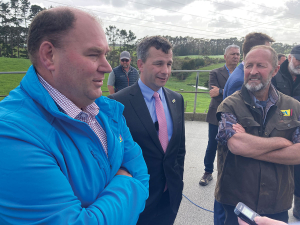Research shows that maximum on-farm opportunity is based on financial and business acumen not farm type, size, region or age of operator.
When we asked farmers what opportunities they were seeing over the next three years, 78% were looking to reduce debt, 68% want to improve farm financial performance and 63% want to increase farm production.
It's clear farmers know the key to long-term sustainability is through increased productivity and profitability, and a significant number of farmers are achieving this.
So what are these farmers doing differently? One of the consistent themes we see with farms that are outperforming is they have a defined business plan which they measure their progress against via benchmarking and budgeting.
For many business owners, including farmers, the idea of a business plan conjures up images of lengthy documents or a bureaucratic compliance exercise designed to define success. It's quite common for business owners and farmers to believe there is no need for a plan.
From my experience with commercial businesses, it is clear the business owner who has a clearly defined plan is the one most likely to achieve his or her goals. Which makes sense – if you are driving with a map, you are likely to reach your destination more quickly than if you are driving without one.
After speaking to hundreds of business owners about planning, it's clear there is no right format for a plan, other than a format that works for y
our business. However, having a plan that is documented, referred to and refreshed on a regular basis does seem to make a difference.
We consistently hear the process of planning is a beneficial exercise because it forces the owners to actually define the objectives of the farm business and identify some tangible steps to achieve these objectives. In addition to this, having something that is documented allows for more meaningful conversations with advisers because everyone can see what it is you are aiming to achieve.
From a banker's perspective, being able to see the long-term aspirations of your farm is also beneficial as it assists us to develop a banking solution that addresses not only your immediate needs but also helps get you closer to your achieving your long-term goals.
While writing the plan is a great first step, real success seems to come when the owners make an effort to review the progress against the plan and to measure what is working and what areas needing more attention.
Farmers have a unique benefit over their commercial counterparts because of the collaborative, non-competitive environment they operate in. There's a fair bit of transparency and a willingness to share information between farmers as well as access to industry information that allows you to benchmark your farm performance. This information makes planning much easier as it gives a good sense of what is achievable and helps track progress. Your industry association is a good starting point to source information about your sector, or speak to your accountant or bank manager.
• Graham Turley is Managing Director, Commercial & Agri at ANZ








